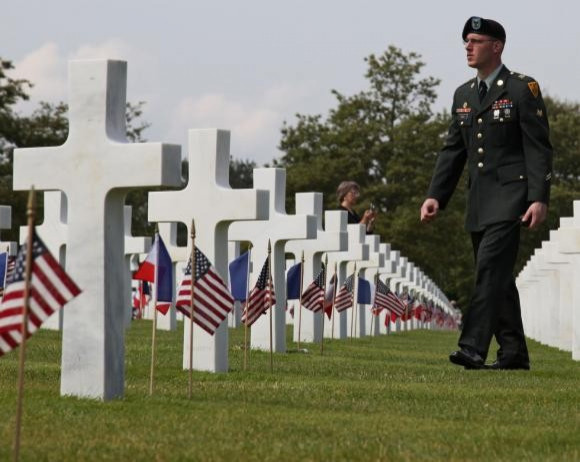D Day and the Delaware: Two improbable water crossings shaped U.S. history

As Americans mark the 67th anniversary of the D Day invasion of Normandy in World War II, they may recall another dangerous water crossing that proved pivotal in U.S. history: Gen. Washington's crossing of the Delaware. Both crossings were made in unfavorable weather which, while making the operation more difficult, surprised the enemy. Both were big gambles. Both proved to be the beginning of a more resolute American involvement in key wars.
The D Day landing, the largest amphibious invasion in history with more than 160,000 troops and 5,000 watercraft involved, was almost canceled, because on June 4, 1944, the seas were too turbulent, the winds too strong, and the clouds too thick for air support. Instead of crossing the English Channel, troops already loaded onto landing craft were forced to take shelter in bays along the English coast to wait out the weather. Gen. Dwight D. Eisenhower, who was in command of the Allied Forces, had to make a quick and hard decision. The invasion was dependent on the full moon on June 6--the resulting moonlight was needed for vision and the high tide was necessary so boats could get over obstructions the Germans had placed in shallow waters along the shore. Waiting for the next full moon would have created a logistical nightmare, as troops were already loading in English ports for a second wave of invading forces. Eisenhower's meteorologist predicted a relative break in the weather on June 6, and Eisenhower gave the go ahead.
On the Axis side, the poor weather convinced German commanders that no invasion was forthcoming. Field Marshall Erwin Rommel, arguably the most able of the German generals, noted for his strategic brilliance in the North African theater, was so convinced that all was safe that he took a few days off to be with his wife on her birthday.
The Germans had warnings that the invasion was imminent. BBC radio, which had been broadcasting cryptic messages intended to create distraction from genuine messages to French Resistance fighters, broadcast in French on June 5 the carrots are cooked and the dice have been thrown--signals to the Resistance to destroy railways, electrical substations, and other infrastructure in preparation for the invasion. A line from a poem by Verlaine, soothe my heart with a monotonous languor, broadcast late on June 5, told the Resistance that the invasion was imminent. The German intelligence service figured out the meaning of the Verlaine quote and alerted German command, but their warning was not heeded.
Allied forces established a foothold in Western Europe thanks to D Day and the Normandy campaign, and German forces were pushed back to the Seine ahead of the Allies' goal of 90 days. Some position the Normandy invasion as the beginning of the end of Germany's success in World War II, although the heavy losses Germany had already incurred on the Russian front make this assertion debatable. Regardless, the successful invasion improved the morale of Allied troops and citizens and gave them a focal point for the war on the Western Front. It looms large in the collective U.S. memory of World War II, a sign of American willingness to engage in what many consider a just war.
George Washington needed to make a hard decision quickly in the closing days of 1776, too. Many of his men would be freed from their enlistments shortly, and 1,700 of his 6,000 men were unfit for service due to injury or illness. But reinforcements from Gen. John Sullivan and Gen. Horatio Gates arrived on Dec. 20, and Washington decided to make his move. He told his staff the army would cross the Delaware River from Pennsylvania into New Jersey on the morning of Dec. 26 and attack the Hessian forces stationed in Trenton.
On Christmas Day the troops marched quietly to their crossing point, assembling by the river at about 6 p.m. under drizzle, sleet, and snow. Floating ice in the river made the cold crossing more difficult and dangerous. The logistics and execution of the crossing was handled by Henry Knox. Only one American soldier fell into the water on that first crossing. Eighteen pieces of artillery and the horses to move them crossed safely.
On the other side, Washington encountered little resistance. The Hessians were sleeping off a Christmas celebration, confident that no attacks would occur. Washington and his 2,400 men captured the British garrison and two thirds of the 1,500 men stationed there, surprising them before the hired Hessians could resist. Legend has it that the commander of the Hessians had been warned of the crossing, but he crumpled the message up and shoved it into his pocket, unread.
The numbers of men involved in the battle were small, but the victory's effect was enormous. Enlistments in the Continental Army went up, and Americans finally had reason to believe they could throw off British rule.
Two historic water crossings, two pivotal events in U.S. history that stand as symbols of fortitude, bravery and honor.
© Copyright IBTimes 2024. All rights reserved.





















